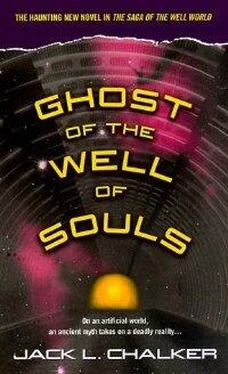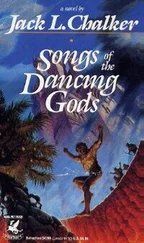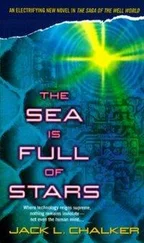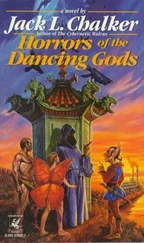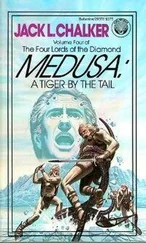Jack Chalker - Ghost of the Well of Souls
Здесь есть возможность читать онлайн «Jack Chalker - Ghost of the Well of Souls» весь текст электронной книги совершенно бесплатно (целиком полную версию без сокращений). В некоторых случаях можно слушать аудио, скачать через торрент в формате fb2 и присутствует краткое содержание. Год выпуска: 2000, ISBN: 2000, Издательство: Del Rey / Ballantine, Жанр: Фантастика и фэнтези, на английском языке. Описание произведения, (предисловие) а так же отзывы посетителей доступны на портале библиотеки ЛибКат.
- Название:Ghost of the Well of Souls
- Автор:
- Издательство:Del Rey / Ballantine
- Жанр:
- Год:2000
- ISBN:0-345-39485-2
- Рейтинг книги:4 / 5. Голосов: 1
-
Избранное:Добавить в избранное
- Отзывы:
-
Ваша оценка:
- 80
- 1
- 2
- 3
- 4
- 5
Ghost of the Well of Souls: краткое содержание, описание и аннотация
Предлагаем к чтению аннотацию, описание, краткое содержание или предисловие (зависит от того, что написал сам автор книги «Ghost of the Well of Souls»). Если вы не нашли необходимую информацию о книге — напишите в комментариях, мы постараемся отыскать её.
Ghost of the Well of Souls — читать онлайн бесплатно полную книгу (весь текст) целиком
Ниже представлен текст книги, разбитый по страницам. Система сохранения места последней прочитанной страницы, позволяет с удобством читать онлайн бесплатно книгу «Ghost of the Well of Souls», без необходимости каждый раз заново искать на чём Вы остановились. Поставьте закладку, и сможете в любой момент перейти на страницу, на которой закончили чтение.
Интервал:
Закладка:
Kalindan—Yabbo Border
Did you ever feel like bait?
Ari knew just exactly what Ming meant by that. Frequently. Like now.
They had indeed had some training back in Kalinda with the police and intelligence agencies, but these only gave them some general idea of what their destinations might be like, and some additional hand-to-hand defensive training for their underwater environment. On the basics, they knew far more than their instructors did, and seemed to have more experience and fewer scruples as well. Still, it wasn’t lost on either of them that sending a single unescorted non-native into other countries and environments wasn’t the best way to gather information and ensure it would get back to whomever needed it. No, clearly they were wanted out of Kalinda for some reason by both the Powers That Be and Core. Anyone working for their enemies would have no doubt whatsoever why they were there. They weren’t even provided with cover identities or a cover mission; in effect, they were simply being sent on a journey to the nations bordering Kalinda to get “experience.”
Think anybody is gonna be fooled that maybe we’re off on some desperate mission or something and drop all plans to target Kalinda? Ming asked sarcastically.
It seems to me that Josich was known to be ruthless, amoral, merciless, dishonorable, and that’s just for starters, but never did I hear him described as stupid. Nor were his agents incompetent, either.
Think they expect us to get back alive? Ming asked her partner in mind.
Probably not. I don’t think they’re out to kill us, though. I think they just don’t give a damn.
That was probably the hardest idea to accept. The object was to get rid of them, and maybe distract some enemy agents, but it wasn’t in the hope that they could really divine anything of importance. Somebody just wanted them out of Kalinda.
Kalinda’s “highways” were marked by varying colored strings of a naturally occurring substance that could be “tuned” to any depth. It stayed in place by means of treating it with certain magnetic properties. The combination of color and depth allowed anyone to travel almost anywhere in the hex without getting lost or disoriented once they had the code. Some were strictly for motorized traffic, others for swimmers. Although Kalindans were not dependent on sight and could be comfortable at depths of at least a thousand meters— depths that would crush many organisms not born and bred to those levels—they were a high-tech people, with the usual overdependence of such advanced races on their technology over their natural abilities. As such, vision was a commonly used sense, particularly at the levels at which the majority spent their lives.
Much of Kalinda was a series of high plateaus and underwater tablelands; while the valleys went very deep, they weren’t wide. The cities in which most people lived were, on average, no more than 350 meters down.
Coming from an even higher technological society, Ari and Ming had felt fairly comfortable in the Kalindan cities. Out here there was only the crisscrossing colored lines to show the routings in three-dimensional space.
There was some traffic. Most motorized transport was in the one to two hundred meter range, between towns, so it would be both out of the way of most swimming traffic and also fairly easy to maintain at a decent pressure. And, as in most technological civilizations, ancient roadways that were the underwater equivalent of long-range footpaths did not have very many people on them. Most took the trains or rented motorized scooters.
They were not more than half a day out from the Kalindan capital of Jinkinar and already they were the only ones on the road. Not that they felt alone; out here, away from the noise of the city, it was louder than ever.
The water was filled with sounds of all kinds. Loud sounds, soft sounds, clicks, whirs, whooshes, even the sounds of unknown beasts and the calls of bizarre creatures they weren’t sure they wanted to meet. These, combined with the rumbles and motor noises and whines from the steady powered traffic a hundred meters above them, made it almost a cacophony of confused tones.
This was where not being a native caused problems. Anyone who was born and raised a Kalindan would know what the sounds were, and which were worth attention. No quick course in Kalindan wildlife could possibly substitute for that experience.
They did quickly learn about some minor noises. The windlike rushing of a school of colorful if exotic-looking fish, for example, was quite handy. Anyone who needed to could eat on the fly. Virtually all the fish in the region—except a few untouchables—were quite edible.
When the Well World made someone into one of its own 1,560 races, it did so with a balance; certain things it gave as if one were native, so that he or she stood a good chance of surviving. Experience, however, it could not give.
Ari decided to test out some Kalindan abilities while still in friendly territory. Closing his large, round eyes, which could convert the smallest light into usable views, he allowed the other senses of their shared body to take control. It was easy to use them, but much more difficult to interpret them.
The sounds were part of it, of course—as much a distraction as a help—but they were peculiarly localized in time and space. Even if he didn’t know what was making most of them, he found it relatively easy to estimate how far away they were and in what direction they were moving.
And then there were the sounds he could make. They emanated from a small protruberance on the face, about where a conventional air breather’s nose would be, and they were quite distinctive—or, more properly, it was quite distinctive. A long, pulsing, high-pitched sound well above the range of their old human hearing, it was caught not just by the ears but by other bodily sensors and sent to the brain for interpretation. It illuminated everything within thirty to forty meters around them. It was constant, like having unblinking eyes that could see in all directions at once. The images the sonar-like system sent to the brain were not interpreted as pictures, but were so recognizable that they might as well have been. Rocky outcrops from below, the route lines, fish, small crustaceans, anything at all was clearly defined. The brain also did some kind of math that neither Ari nor Ming could have done consciously. By simply concentrating on a single fish, they instantly knew its size, shape, speed, and even type. It was easy to track and catch.
Finally, there was what Kalindans called their “sixth” sense. Rather than telepathy, it allowed them to sense changes in both the planetary and even the individual organism’s magnetic field. It oriented them and also revealed anything nasty that might be waiting beneath the sand or disguised in one of the reefs or rocky outcrops.
This sixth sense wasn’t unusual among water-breathing races, but was unlike anything Ari and Ming had experienced before. Kalinda had long ago been relieved of any predators who could threaten Kalindans, but out in the rest of the world, where things didn’t work by Kalindan rules, the sixth sense was one of their most vital abilities.
Why didn’t we just rent one of those motor scooters at least as far as the border? Ming complained.
Because they didn’t offer one, and we’ve precious little in the way of money or lines of credit, as you well know, Ari responded. Besides, I seem to remember someone telling them that it would be good to practice in Kalinda before leaving it, and that they needed the exercise.
Don’t rub it in!
The hardest thing about being a Kalindan, Ari reflected, was thinking in three dimensions. Walking in a normal situation back in the Commonwealth was essentially a two-dimensional affair; he didn’t look up unless someone yelled, and he concentrated on one direction at a time. To go up, he needed some kind of aid, such as stairs or a lift. This was more like being in space without the suit. He floated, not on top but within the environment, and he could rise or drop as easily as going backward or forward. To do this without a suit or suit controls was unnerving in and of itself.
Читать дальшеИнтервал:
Закладка:
Похожие книги на «Ghost of the Well of Souls»
Представляем Вашему вниманию похожие книги на «Ghost of the Well of Souls» списком для выбора. Мы отобрали схожую по названию и смыслу литературу в надежде предоставить читателям больше вариантов отыскать новые, интересные, ещё непрочитанные произведения.
Обсуждение, отзывы о книге «Ghost of the Well of Souls» и просто собственные мнения читателей. Оставьте ваши комментарии, напишите, что Вы думаете о произведении, его смысле или главных героях. Укажите что конкретно понравилось, а что нет, и почему Вы так считаете.
